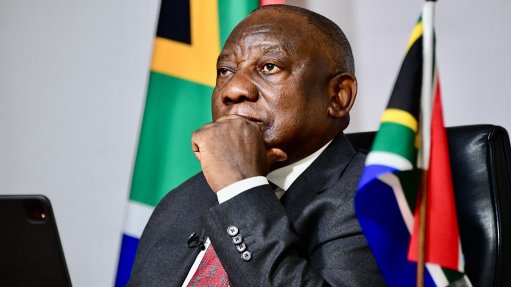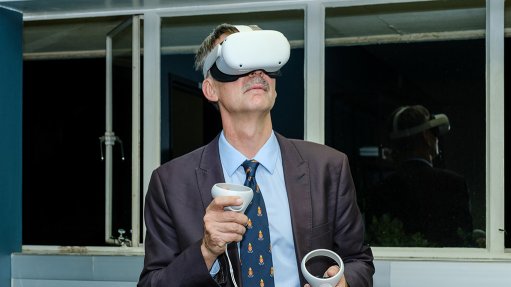Choices and consequences in keeping South Africa’s lights on
This article has been supplied as a media statement and is not written by Creamer Media. It may be available only for a limited time on this website.
On Thursday at the Hyatt Hotel Sandton on 15 August the Fossil Fuel Foundation is hosting a conference that promises to be a rich mix of opinions and controversial views: The SA Electricity Supply - The True Cost of Electricity Options and the choices for South Africa. Some will argue that lowest cost supplies are the key to unlocking the country’s growth potential and thus mitigate social problems and poverty. Others will argue that if environmental factors are not managed, the future will be seriously compromised and social issues will emerge on a massive scale. This one day conference will bring together experts from various sectors of the electricity business to debate, in open forum, the most appropriate mix of electricity generating options for South Africa. Fundamentally trying to answer the questions; what is the most appropriate electricity generating mix for South Africa? Should some technologies be avoided and others favoured? What are the social, environmental and economic reasons behind these opinions?
Eskom communicates it can take up to 7 years to build a new coal power station (at least this is how long Medupi is taking) and Nuclear even longer. Both have strong opposition from environmentalists. A new wind or solar plant can take as little as two years - however there are drawbacks to these renewables – no wind or sunshine = no power and the power flows intermittently depending on the weather. According to the Bloomberg New Energy Finance research group, renewable energy investment in South Africa totalled $5.5bn in 2012 – more than China, Japan and many other ‘would-be green’ economies. Not bad for the world’s seventh-biggest coal producer! In the last quarter of 2012 the U.N. projected that by 2020 the value of the African renewable energy sector would be $57 billion. As the present energy supply barely meets the demand, solar power is increasing in importance in this country’s economy and electricity supply strategy. Initially, high costs were the major deterrent but as technology has become more affordable and the threat of power outages increases, solar power is increasing in importance.
Renewables could account for 9% of the country’s energy mix by 2030 if the government’s IRP (Integrated Resource Plan) to supplement coal power plants is implemented.
South Africa’s first independent gas engine power plant at the Sasolburg site has been producing above its rated capacity of 152 MW since coming on line in December 2012 and will operate at 175MW over its first year of operation. The turnkey project was completed three months ahead of schedule and almost 20% below budget. (Engineering News 10 July 2013.) Gas engine power plants require less time to build and install, usually taking between 20 and 30 months. With promising gas reserves being explored in Southern Africa what role will gas play in the future electricity mix? The European Wind Energy Association reported recently that in the first half of 2013 a total of 1,045 MW of offshore wind capacity was now fully connected to the grid in Europe. Although this was more than double the 523MW installed in the same period of 2012 there was evidence of a slowdown in the industry reflecting the regulatory uncertainty in key offshore markets including Germany and the UK. However in the latest Ernst & Young index, China’s wind power capacity has increased as onshore wind farm construction has grown 40-fold over the last decade in this emerging economy.
One of the conditions of a World Bank loan to finance Medupi and Kusile was the undertaking by Eskom to build two renewable-energy plants, one wind and one solar. The National Energy Regulator recently gave the nod to go ahead with the 100MW Sere wind farm in the Western Cape. From 2014 the 46 turbines will produce enough power for 97 000 homes for the next 20 years. Saliem Fakir, the head of the Living Planet unit at the World Wide Fund for Nature and respected speaker at Fossil Fuel Foundation conferences, said wind power’s quick construction phase made it perfect in the current energy crunch Global electricity generation from nuclear dropped 7% in 2012 and is down nearly 12% from 2006's peak of 2,660 TWh, according to the World Nuclear Industry Status Report 2013. ."About three-quarters of this decline is due to the situation in Japan, but 16 other countries, including the top five nuclear generators, decreased their nuclear generation too," the report said. So South Africa is faced with many options, each with its own pros and cons. The Fossil Fuel Foundation one day event promises to be an interesting debate as proponents of the various technologies put forward the case for their particular favourite.
Comments
Announcements
What's On
Subscribe to improve your user experience...
Option 1 (equivalent of R125 a month):
Receive a weekly copy of Creamer Media's Engineering News & Mining Weekly magazine
(print copy for those in South Africa and e-magazine for those outside of South Africa)
Receive daily email newsletters
Access to full search results
Access archive of magazine back copies
Access to Projects in Progress
Access to ONE Research Report of your choice in PDF format
Option 2 (equivalent of R375 a month):
All benefits from Option 1
PLUS
Access to Creamer Media's Research Channel Africa for ALL Research Reports, in PDF format, on various industrial and mining sectors
including Electricity; Water; Energy Transition; Hydrogen; Roads, Rail and Ports; Coal; Gold; Platinum; Battery Metals; etc.
Already a subscriber?
Forgotten your password?
Receive weekly copy of Creamer Media's Engineering News & Mining Weekly magazine (print copy for those in South Africa and e-magazine for those outside of South Africa)
➕
Recieve daily email newsletters
➕
Access to full search results
➕
Access archive of magazine back copies
➕
Access to Projects in Progress
➕
Access to ONE Research Report of your choice in PDF format
RESEARCH CHANNEL AFRICA
R4500 (equivalent of R375 a month)
SUBSCRIBEAll benefits from Option 1
➕
Access to Creamer Media's Research Channel Africa for ALL Research Reports on various industrial and mining sectors, in PDF format, including on:
Electricity
➕
Water
➕
Energy Transition
➕
Hydrogen
➕
Roads, Rail and Ports
➕
Coal
➕
Gold
➕
Platinum
➕
Battery Metals
➕
etc.
Receive all benefits from Option 1 or Option 2 delivered to numerous people at your company
➕
Multiple User names and Passwords for simultaneous log-ins
➕
Intranet integration access to all in your organisation


















